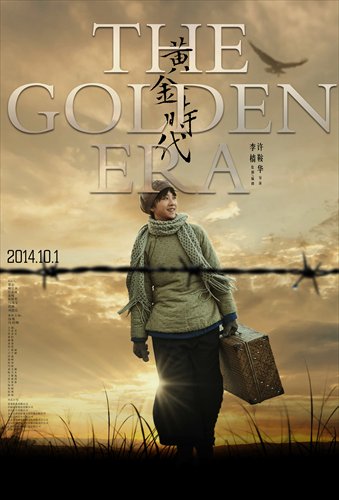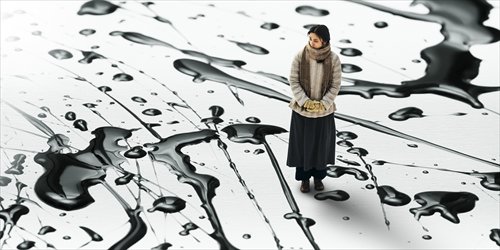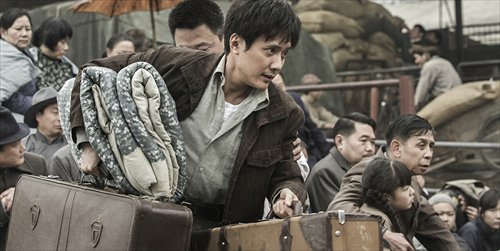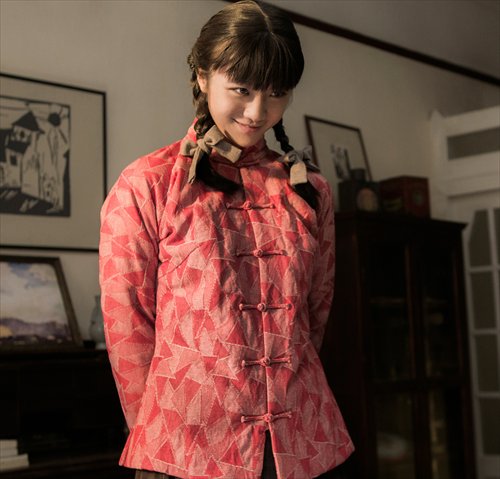The Golden Era
New film makes a noble, if ultimately unsatisfying, attempt to look at the short, literary life of famed writer Xiao Hong
Employing an elaborate narrative structure and plot points supported by reference material, award-winning Hong Kong director Ann Hui makes it clear that her new biopic The Golden Era is the first cinematic attempt to take the life of one of China's best-known female writers Xiao Hong (1911-42) seriously, though perhaps a bit too seriously for those uninitiated with the subject and her writings.

Casting Chinese actress Tang Wei (Lust, Caution) as Xiao Hong, the three-hour film flows along as screenwriter Li Qiang invites more than a dozen fictional versions of Xiao Hong's acquaintances - family members, lovers and friends - to present their own accounts of the writer, covering her adolescence to her early death at the age of 31 in Hong Kong.

Chinese actress Tang Wei and actor Feng Shaofeng play Xiao Hong and Xiao Jun respectively in The Golden Era. Photos: CFP

Chinese actress Tang Wei and actor Feng Shaofeng play Xiao Hong and Xiao Jun respectively in The Golden Era. Photos: CFP

Chinese actress Tang Wei and actor Feng Shaofeng play Xiao Hong and Xiao Jun respectively in The Golden Era. Photos: CFP
Hui is notably bold as she adopts a semi-documentary approach with the "family members" and "friends," who often turn to the camera and directly address the audience to share their recollections.
The "lovers," on the other hand, speak through their writings related to Xiao Hong. Their accounts, mostly written after the death of the protagonist, form some of the film's most important scenes.
One good example is the first encounter between Xiao Hong and the love of her life, Xiao Jun (Feng Shaofeng). Xiao Jun visits Xiao Hong amid financial and emotional crisis, and they exchange ideas on literature, romance and life. It makes for a loyal visualization of Xiao Jun's literal record. Parts of the original texts, read out by an older Xiao Jun, are inserted now and then to complement the picture.
One of Xiao Hong's own stories, Family Tutor, which recorded the poverty-stricken couple happily treating themselves to meatball soup at a small eatery after Xiao Jun earned some money by tutoring, is retold meticulously. In this episode, the two protagonists' hunger is as vivid as their contentment. The warmth between the lovebirds, which is as rough as it is tender, seems almost immortal when set against the cold winter of Northwest China.
Yet, when the protagonist says half sadly and half sarcastically later in the film that "my books will be read by few, but my gossip will go on and on," one cannot help but wonder if The Golden Era is itself reinforcing that prophecy.
While the film is not necessarily overplaying Xiao Hong's relationships with Xiao Jun and husband Duanmu Hongliang (Zhu Yawen) among a few others, it would be much better if it looked into how these relationships - the fodder for much "gossip" - influenced her as a writer.
For example, there is the competitive tension between Xiao Hong and Xiao Jun, who is uncomfortable that Xiao Hong overshadows him in literal creation and asserts that he also contributes to her success. This could have been developed into something that gave us more insight into Xiao Hong's talent and character. How does Xiao Hong manage to write and to write well when she lives in the shadow of her lover's jealousy? How does she regard what Xiao Jun sees as his literary gifts to her? Unfortunately, these are questions that the film fails to touch upon. The failure appears to stem not from a lack of source material, but more from the director's attempt to pack in as much as possible.
True, none of the events in Xiao Hong's 31 years - breakup with her family, relationships, childbirth, meetings with the influential writer Lu Xun (Wang Zhiwen), fleeing due to war, and the sickness that finally kills her - are neglected. It is hard to ask a biopic that intends to hit all the notes to refrain from being somewhat skin-deep.
Though The Golden Era can not be counted as a particularly good or enjoyable film, it is no doubt a work of great sincerity and courage, which not only sets it apart from most Chinese cinematic productions, but also connects it more closely with Xiao Hong.
Everyone's a critic
Xie Qun
30s, English lecturer and poet
"After reading Xiao Hong's book The Story of Hulan River, I had a craving for tofu; and after seeing the film, I had a craving for meatball soup. In this way, the film echoes the book, and the protagonist does catch those delicate threads of hunger, vitality and sense of being."
Mr Huang
24, translator
"It seems more like a kind of cosplay than a film. Everything is terrible. But I feel sad at the news of the low box office, because it is a serious film and the failure of which might kill the spirit of risk that is needed in filmmaking."